If you click on a link and make a purchase we may receive a small commission. Read our editorial policy.
Wonder Woman: The best comics of DC's amazing Amazon
Wondering where to wander with Wonder Woman? Wonder no longer.

Popverse's top stories
- "And my axe!" Lord of the Rings star John Rhys Davies says there's one world leader who deserves Gimli's iconic weapon
- Wonder Man is the Andor of Marvel Studios’ modern TV series on Disney+
- Absolute Batman happened because DC Comics writer Scott Snyder got bored reading about ‘superhero fatigue’
With two feature films, a three-season television series in heavy syndication over decades, a major video game in development, and several waves of feminism which have claimed her as a personal icon, Wonder Woman is one of the most recognizable heroes under the banner of DC Comics. Number three, some would say, right behind Batman and Superman. And yet, despite being in continuous publication since her debut in 1941, it’s not the easiest thing in the world to find a great Wonder Woman comic recommendation.
For one thing, it’s difficult to know where to start. For another, unlike Batman and Superman, Wonder Woman has rarely been afforded the width of titles and spin-off series as her two cohorts in DC’s 'Trinity.' That isn’t to say there isn’t a wealth of great Wonder Woman comics out there waiting to be read. Far from it. Even the earliest Golden Age material from William Moulton Marston, a fascinating person in his own right, provides a rich academic examination of a very unique point of view on feminism and women’s rights.
All the same, it’s not necessarily the best starting point for a new reader. Before you head back to the earliest stories of Paradise Island, we have a few selections for you designed to appeal to more modern sensibilities. This is a selection of our favorite Wonder Woman comics.
Wonder Woman: Dead Earth
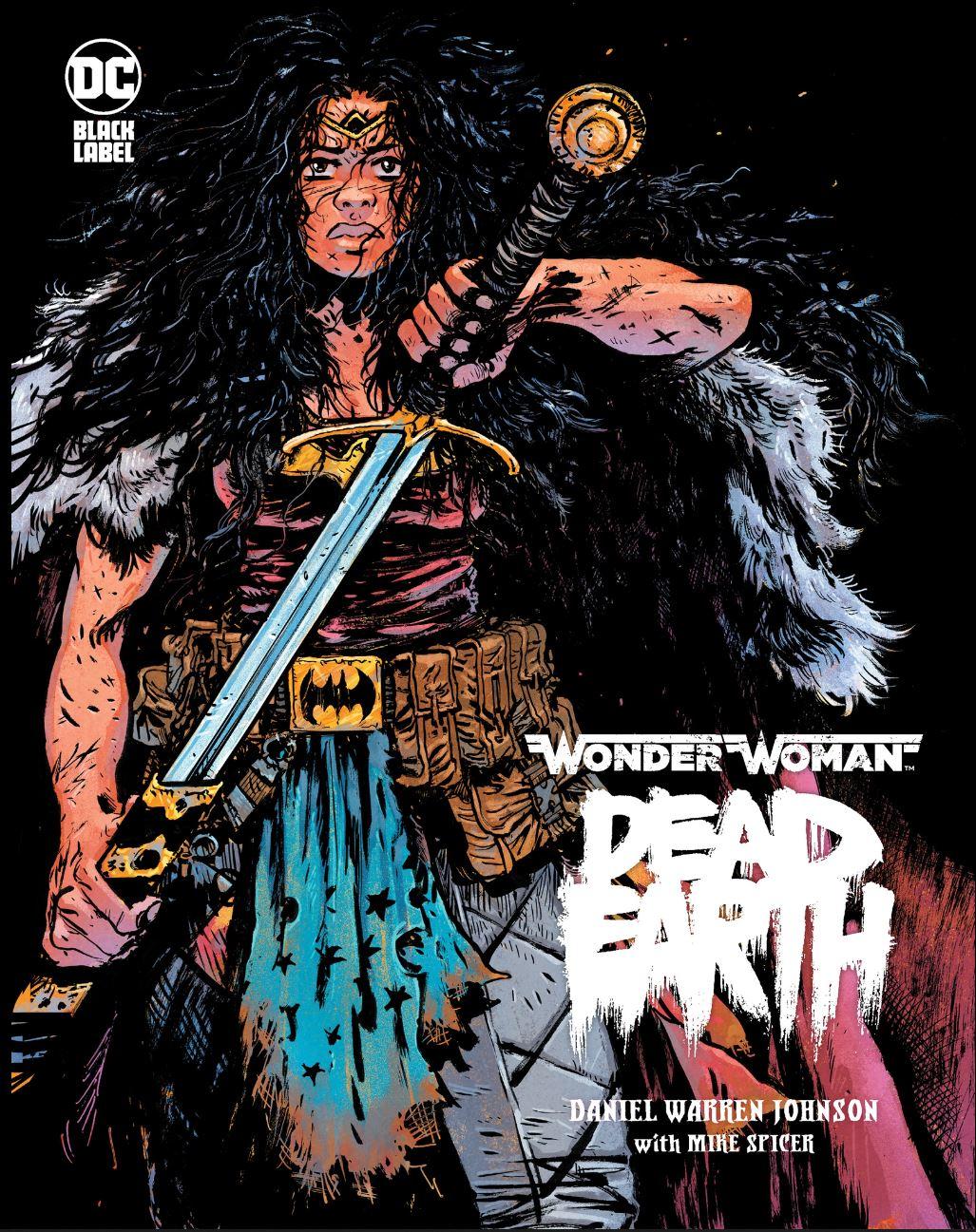
If you’ve read our collection of the best Batman stories, you may have noticed that most of the comics we recommended weren’t too recent. That’s not because Batman comics are getting worse, but because there have been so many varieties of Batman stories for so long that there’s a higher bar for new comics to clear.
Wonder Woman, on the other hand, has only been enjoying the kind of variety Batman has gotten over the past couple of decades. You see, for most of the history of Wonder Woman, if you wanted to read a Wonder Woman comic, your option was pretty much just whoever was on the Wonder Woman ongoing title at the time. There were few miniseries, few great narrative arcs, and few special events. Books like Wonder Woman: Dead Earth show just what a missed opportunity that’s been for so long.
This four-issue prestige series from DC’s Black Label imprint gives us a Wonder Woman who wakes up in the Batcave after the end of the world. No powers, no memory of how she got there, only her mission of love to save what’s left of humanity. Against the bleakest of backgrounds, Diana’s star shines the brightest, showing just who the character is when you take away all the superficial trappings. Clever recontextualizations of Wonder Woman’s classic origin, weaknesses, and supporting cast are more than enough to keep devoted Wonder Woman fans reading, but it’s the powerful visuals of Diana fighting for love and truth in a blighted landscape that makes this one impossible to put down before it all comes to a bloody and brutal end.
Justice League Dark (2018)
Every once in a while, you might step into a conversation about which member of the Justice League should be considered the 'leader.' The truth is that the Justice League has rarely ever worked that way. But as the princess of a nation and a diplomatic representative of her people, Wonder Woman makes for a strong candidate. Diana has never taken charge of the Justice League proper on her own, but she did spearhead her own mystical subdivision of the team. Justice League Dark is a series which brings more magical heroes together against threats that can’t be explained by common science.
There have been multiple incarnations of the JLD, but the 2018 series puts Diana in the driver’s seat when the laws of magic, such as they are, begin to malfunction. Watch Wonder Woman lead Zatanna, Swamp Thing, Detective Chimp, and unlikely ally Man-Bat against forces too dark for the Justice League A Team.
Wonder Woman: The Hiketeia
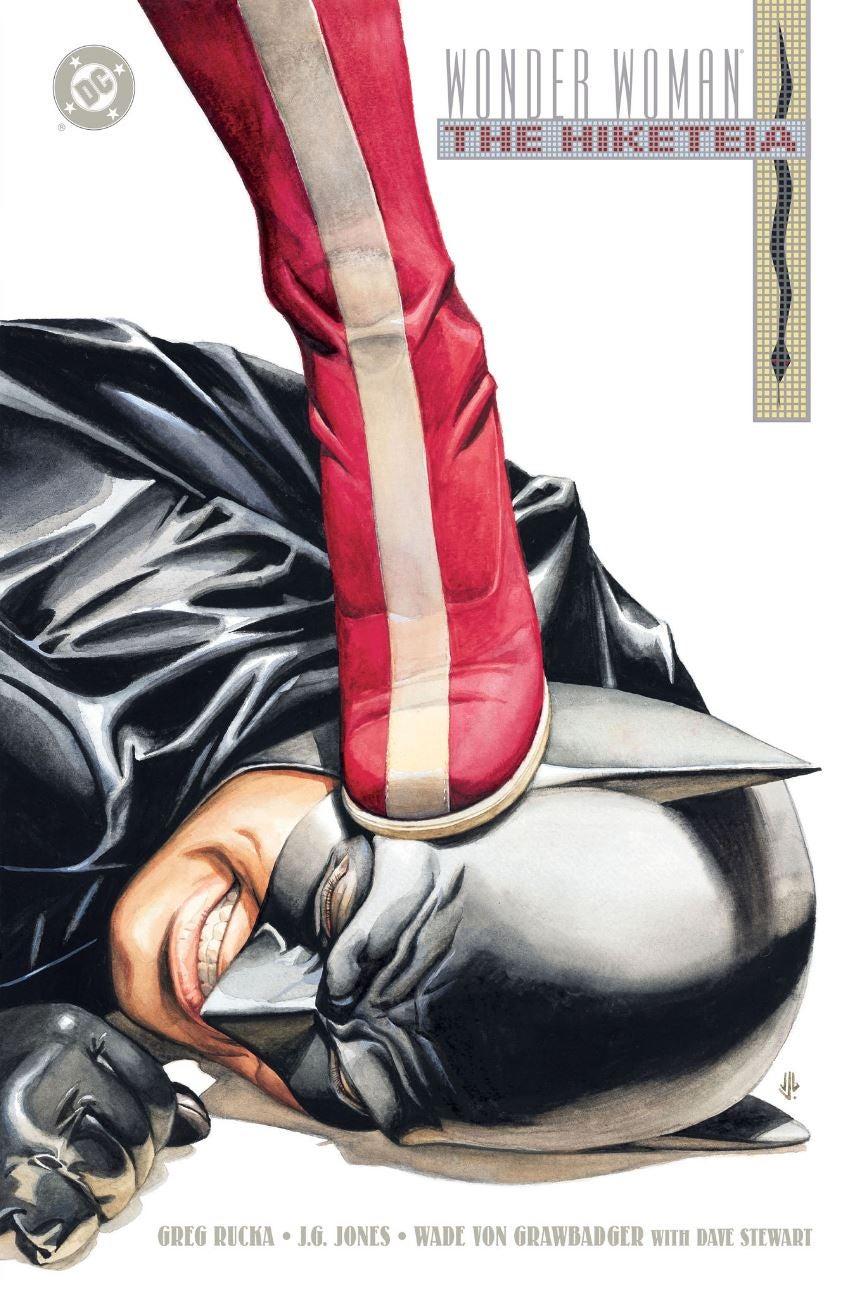
When you start asking about the greatest living Wonder Woman writers, there’s one name you’re going to hear a lot: Greg Rucka. At a time of uncertainty for the character in 2002, Wonder Woman: The Hiketeia was Rucka’s first shot at the character with a rare standalone graphic novel. It may have helped that the cover featured Batman’s face getting flattened by Wonder Woman’s iconic boot. As much an examination in the difference between Wonder Woman and Batman’s ideals as it is an extremely cool fight establishing just where Diana stands in the DC pecking order, The Hiketeia was the thesis on Diana’s character which proved Rucka was the man for the ongoing Wonder Woman series.
Wonder Woman: The True Amazon
Illustrator Jill Thompson is a modern master of the fairytale format, and in this original graphic novel brings those sensibilities to the DC Universe’s leading lady. A morality play under a backdrop of comic book mythology, The True Amazon examines the consequences of a young woman raised to believe she was born perfect in every way when she encounters her first skeptic. In this surprisingly touching tale of character growth, Wonder Woman: The True Amazon demonstrates that a Wonder Woman isn’t born from gods or sculpted from clay, but must rise to be worthy of the title on her own merit.
Justice League: A League of One
This beautiful hand-painted graphic novel by Christopher Moeller is controversial among Wonder Woman fans for emphasizing an unpopular aspect of the character in her zeal for battle. Wonder Woman, under normal circumstances, should detest violence, saving it only as a last resort. But the epic visuals, the central emotional arc, the sheer volume of hardcore action, and an incredibly strong premise overcome minor character flaws for a hearty recommendation.
Here’s the pitch: there’s a powerful dragon loose in the world, and it’s prophesied that whoever faces it in battle, whether they defeat it or not, will be killed in the doing. When the dragon lands on the Justice League’s radar, Wonder Woman is determined to be the only one who has to die. And so, to save her friends and allies, Diana individually kicks every single Justice League member’s ass so that only she will have to meet her fate. Yeah, that was enough to sell me too.
The Legend of Wonder Woman (2015)
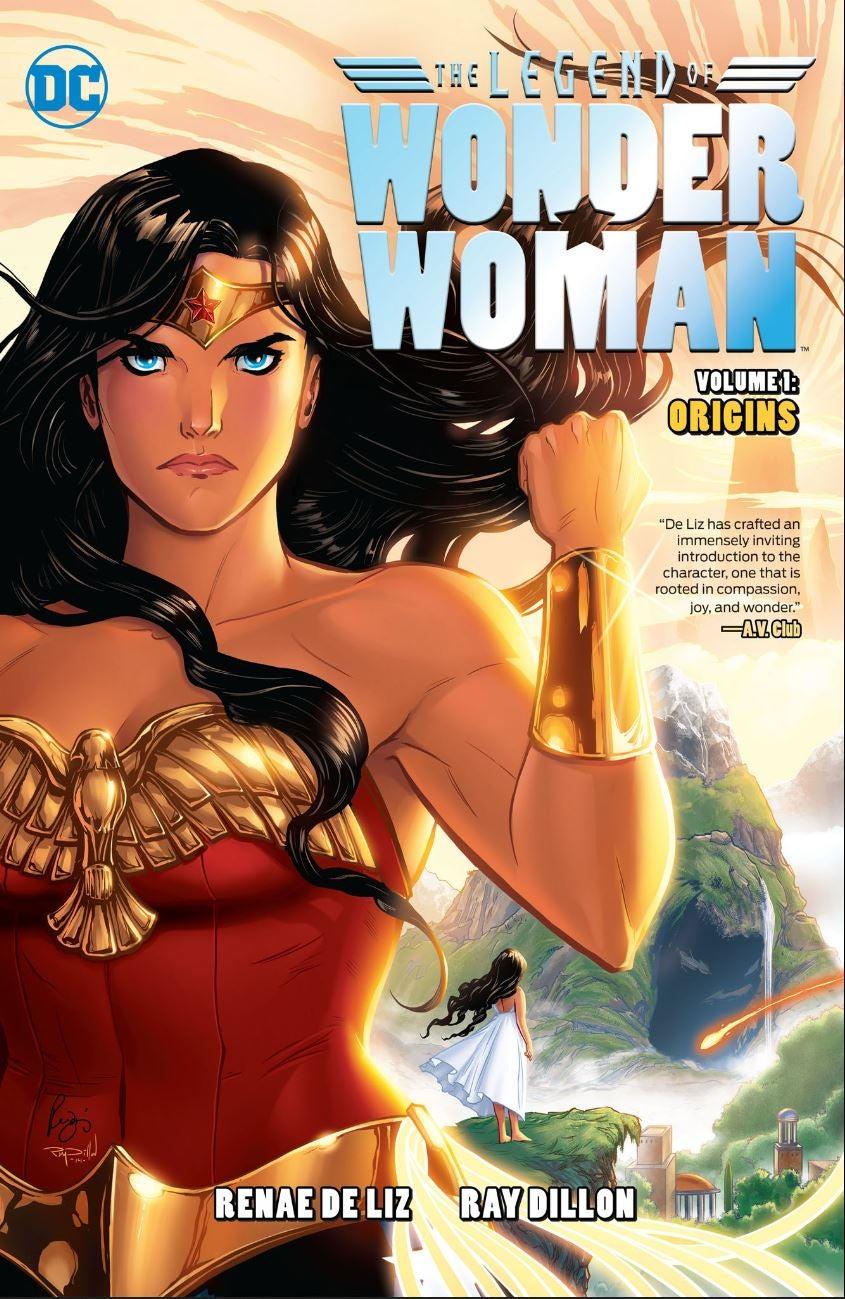
One of the most popular approaches to Wonder Woman, when you want to write about her from scratch, is to take her back to the past. We saw it in the 1970s with Lynda Carter, which took Diana back to her Nazi-fighting Golden Age. We saw it in the movies with Gal Gadot, casting her even further back into World War I.
Like those stories, the tragically short-lived Legend of Wonder Woman by Renae de Liz and Ray Dillon is a gorgeous, fundamental re-examination of the character in her original context as striking and vibrant as Bruce Timm and Paul Dini’s treatments of Batman and Superman. If there were ever a blueprint for a Wonder Woman animated series, these 27 digital comics are the best place to find it.
Wonder Woman: Love is a Battlefield
Wow, we’re already halfway down the list and I don’t see a lot of women on here so far, do you? The truth is that in over 80 years, not too many women have gotten the chance to write a great Wonder Woman story. That’s partially because of the few opportunities afforded to the character outside of her ongoing title until recently altogether, and partially because comic writing under the auspices of DC and Marvel has largely been a male dominated field. But when women do get to write Wonder Woman, it’s usually pretty great. Gail Simone’s run on Wonder Woman in the 2000s remains a beloved staple, for instance, and deserves honorable mention.
But in recent memory, one of the best to ever write Wonder Woman was Ms. Marvel co-creator G. Willow Wilson, examining in depth what it meant for Wonder Woman to be a champion of love. Diana had spent much of the “New 52” era as a scion of war, and before that a beacon of truth. But what did it mean, as she was in Marston’s original mission statement on the character, that her chief patron among the gods was Aphrodite? Wilson’s run, which spans from issues 58-81 of the 2016 Wonder Woman series, is an uncommonly creative treatment of Diana’s world with a wealth of captivating original characters and insight into Wonder Woman’s ideals the depths of which are rarely plumbed.
Wonder Woman: Rebirth

2016 was a time of big promises from DC towards a fanbase which had felt scorned in the years prior over some radical changes, some of which worked and some of which… well, didn’t. But one of the most exciting lures offered by the “Rebirth” initiative was the return of one of Wonder Woman’s brightest stars to the fold: Greg Rucka, who had left the DC writing stable leading up to the “New 52” of 2011. Rucka returned on an ambitious twice-monthly schedule with two legendary artists by his side, Liam Sharp and Nicola Scott.
For 25 issues, Sharp and Scott traded art duties and time periods as Rucka interwove stories about Wonder Woman’s present and past in dual storylines: 'The Lies,' where Diana uncovers a cosmic conspiracy to keep her apart from the true Themyscira, and 'Wonder Woman: Year One,' a new account of Diana’s first encounter with man’s world. Together, both represent a return to form for one of modern comics’ most celebrated writers, although the metafictional baggage it brings in tow may not be for everyone.
Wonder Woman: Eyes of the Gorgon
This right here is the reason everyone was so excited for Greg Rucka to return in 2016. Off the success of Wonder Woman: The Hiketeia, Rucka gave us the greatest run of Wonder Woman comics in the 21st century on the main ongoing Wonder Woman title from 2003 to 2006. This is the run which truly embraces Wonder Woman’s position as an ambassador, emphasizing Diana’s political acumen and wider mission to enlighten humanity in a way that previous efforts since Marston’s have done little more than pay lip service.
That isn’t to say that this run from issues #195-226 of the 1987 Wonder Woman series is without drama. This is the writer who gave us Wonder Woman stomping down Batman, after all. Some of the most memorable and heart-wrenching battles of Wonder Woman’s career take place over this run, from her high stakes coliseum battle with Medusa to a desperate struggle against a mind-controlled Superman. Like All-Star Superman for the Man of Steel, this period really showcases Wonder Woman at her very best and brightest.
Wonder Woman: Gods and Mortals
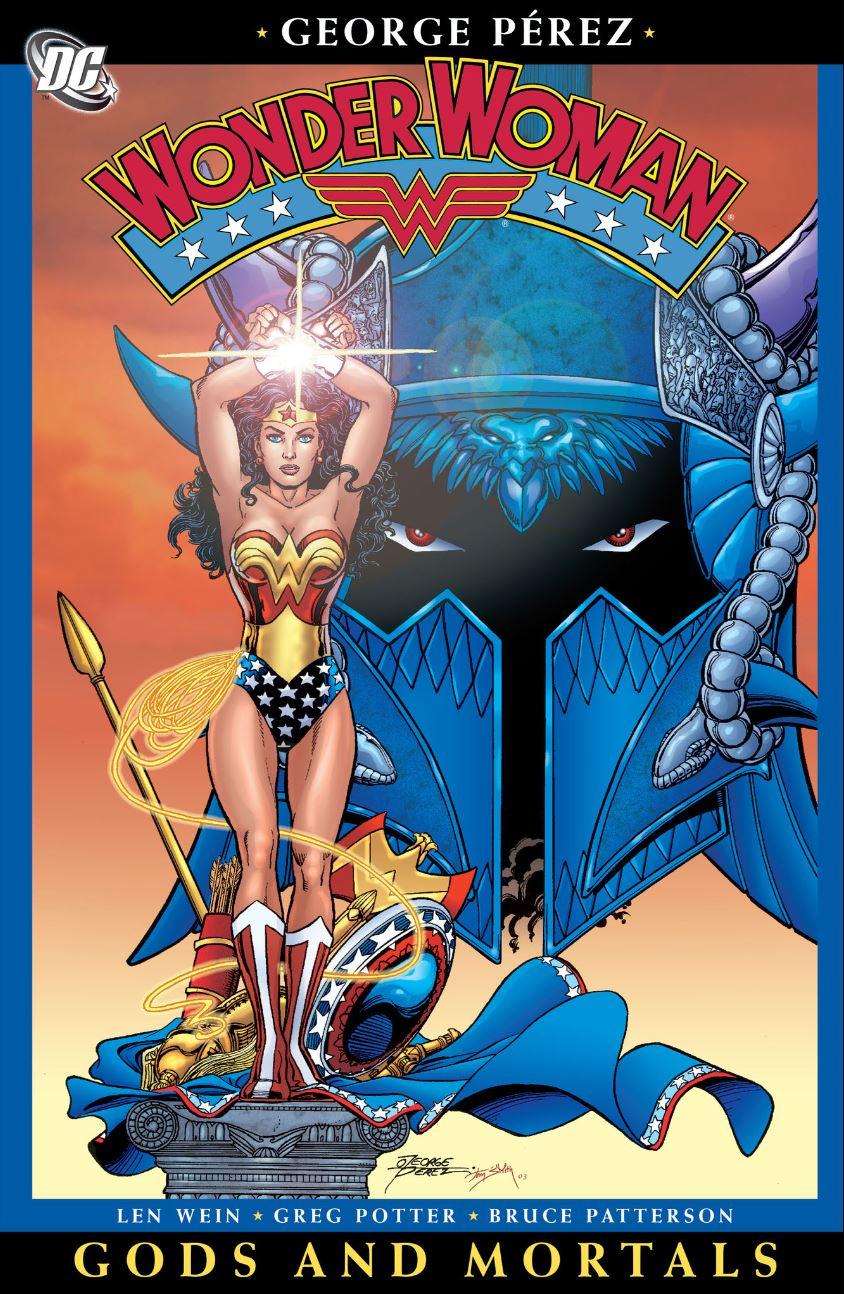
Wonder Woman fans had to know this one was coming. We can’t talk about great Wonder Woman comics without talking about George Pérez. After the grand DC Universe reset button of Crisis on Infinite Earths in 1986, Pérez was granted the unenviable task of reviving Wonder Woman from the ground up to make her more relatable to a new wave of feminism. The last time someone attempted this, no less than the great Denny O’Neil in the 1970s, it turned out to be kind of a disaster. But it was a challenge that Pérez rose to heartily, understanding Marston’s intent that the Greek mythology aspect of Wonder Woman was always secondary to a graspable conveyance of the feminist ideal she was designed to embody.
By rebuilding Amazon society, Diana’s supporting cast, and the basis of her missions in man’s world to emphasize the importance of building up women in a world historically stacked against them, Pérez succeeded in realizing Wonder Woman’s potential in a way that no writer had ever accomplished up to that point – and in doing so, established the framework for every Wonder Woman story that’s followed in the 35 years since. George Pérez’s Wonder Woman saga spans the first 62 issues of the 1987 comic series.
Wonder Woman Historia: The Amazons
As one of the finest comics we’ve ever seen from DC in both art and writing, we’d feel pretty foolish if we left out Kelly Sue DeConnick, Phil Jimenez, Gene Ha, and Nicola Scott’s three volume Wonder Woman Historia: The Amazons. The most recent of our choices, having debuted in 2021, the only reason this isn’t higher on our list is because Wonder Woman herself isn’t really in it until the very end. This deeply moving account of Amazonian history from their own perspectives feels like it truly gives the society of women in that story their own agency for the first time.
Over the years, some have depicted Wonder Woman as the lone hero among a tribe of seclusionist xenophobes. Some have painted the Amazons as tragic victims beholden to the whims of the gods. Only in Wonder Woman Historia are Diana’s people so wholly granted the opportunity to be the heroes of their own story, tragic as it might be. Like living through Bruce Wayne’s night in Crime Alley, knowing Diana’s people is the only way to truly know Wonder Woman. And that’s what makes this book such a necessary cornerstone to the ever-expanding mythology of Wonder Woman. It only has greater heights to climb.
Want to know what's coming up next in pop culture? Check out Popverse's guides to:
Follow Popverse for upcoming event coverage and news
Find out how we conduct our review by reading our review policy
Let Popverse be your tour guide through the wilderness of pop culture
Sign in and let us help you find your new favorite thing.




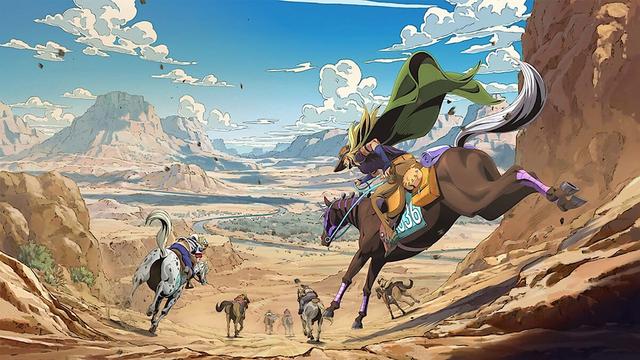











Comments
Want to join the discussion? Please activate your account first.
Visit Reedpop ID if you need to resend the confirmation email.